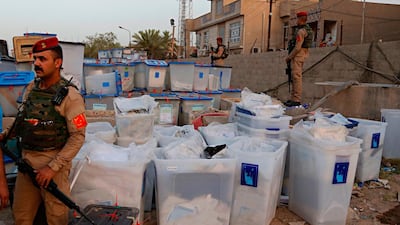Relatives of an Iraqi electoral commission worker have been murdered in their home in what authorities said was a targeted killing in Diyala province. The attack comes amid heightened tension regarding an ordered recount of ballots after last month’s election.
The attack took place on Sunday in the family home of an ethnic Turkmen employee of Iraq’s Independent High Electoral Commission, in the town of Hamrin.
"The attackers used knives to slit the throats of the employee's mother and his three sisters,” said Arshad Al Salihi, leader of the Iraqi Turkmen Front political party. “Three of them were killed and one remains in a critical condition."
The employee, whose identity has not been disclosed for security reasons, was unharmed and was not present at the time of the attack, said Mr Al Salihi.
Diyala’s chief of state, General Mazher Al Azzawi, told reporters that the crime was intentional and authorities have a video recording of the incident that shows the perpetrators.
No group or individual has claimed responsibility for the attack, but previously ISIS threatened to target elections and anyone who participated in the ballot.
The insurgent group remains active in northern Iraq, carrying out sporadic ambushes, assassinations and bombings in ethnically-mixed provinces including Kirkuk and Diyala, where complaints of voter irregularity were high during the May 12 elections.
_______________
Read more:
Iraq politicians announce 'cross-sectarian' coalition
Iraq supreme court orders manual recount of election ballots
Iraqi police clash with pro-Iranian militia in Baghdad
_______________
Following the murders, security officials in Diyala announced that they had launched an operation against ISIS extremists.
The attack is the latest development in an elections saga following a vote that was marred by low turnout and allegations of fraud.
Iraq's supreme court ordered a recount of ballots on June 21, following an earlier resolution passed by parliament.
The law passed by the outgoing parliament also suspended the Independent High Election Commission's nine-member board of commissioners and replaced them with judges.
And on June 10, a fire at Baghdad's largest ballot storage warehouse raised suspicion that unknown persons were trying to destroy evidence of vote rigging.
However, the panel of judges now in charge of the elections commission recount said on Monday that it would only be conducted in contested areas.
The judges said they would only manually recount problematic ballots "out of respect for the will of voters and their rights ... and to preserve their vote which came without any violation."
But that is a step back from the court’s earlier order last Thursday, when senior judge Medhat Al Mahmud said that all 11 million ballots cast would have to be recounted.
Mr Al Salihi the Turkmen politician warned that the reduced remit of the recount would likely produce dissatisfaction from voters.
"If the court doesn't deal with Kirkuk as a special case – due to the high volume of fraud – there will be a second round of protests condemning the attempts to hide the irregularities there," the lawmaker said.
The timing of the recount will be set in the presence of representatives of the United Nations, political entities and of the candidates affected, according to the judges who replaced the IHEC officials and are now in charge of the recount.
An electoral alliance between populist Shiite cleric Moqtada Al Sadr and Iraqi communists won the greatest share of the vote in last month’s election, with some long-standing political figures receiving a diminished share of votes, something attributed to voters tiring of entrenched conflict and corruption.
A recount is unlikely to produce a major change in the number of seats won by rival lists, according to analysts, but could change the rankings of candidates within the same lists.


